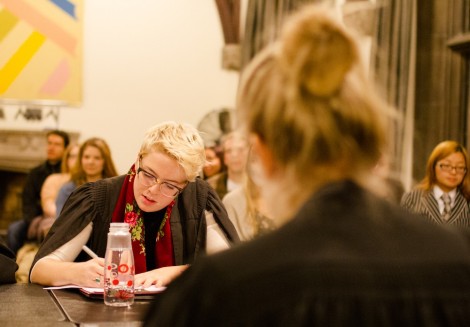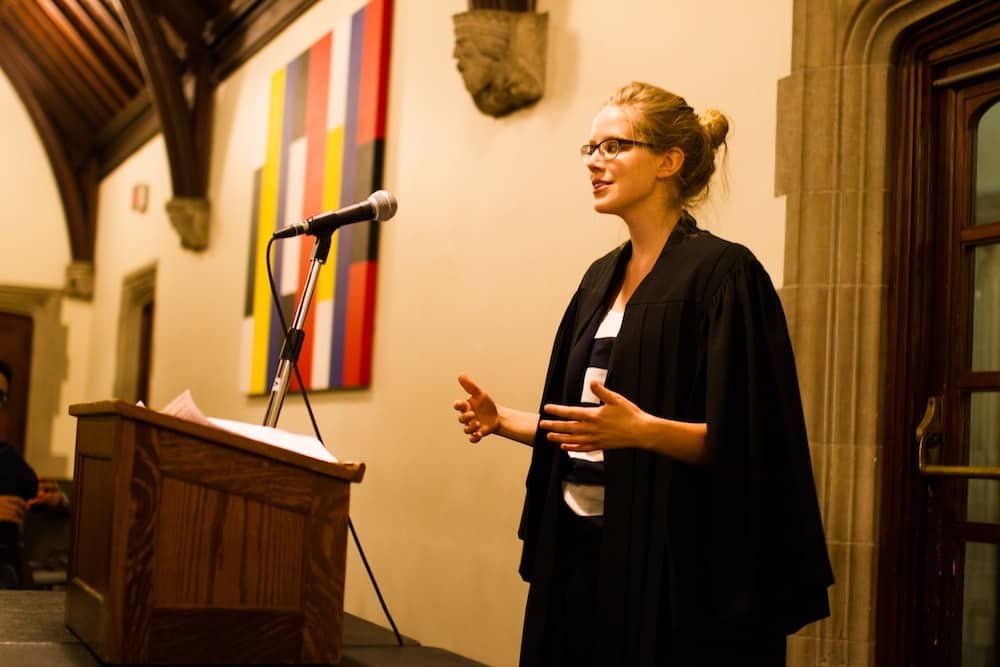The Opposition claimed victory at the Hart House Intercollegiate Debate on Wednesday.
The motion “This House would abolish the college system at the University of Toronto” was defeated after the Opposition (the negating side in the British Parliamentary format of debate) impressed all five judges and the audience voted in a 2:1 ratio for them over the Government (the affirming side). The event attracted around 40 people.
Louis Tsilivis, the Hart House Debates Committee (HHDC) secretary said that: “The issue of colleges resorting to secession in the face of obstinacy from the student government definitely played into” the choice of motion for the debate, referencing the University of Toronto Students’ Union (UTSU) fee diversion conflict. An article written in The Newspaper by last year’s UTSU president Shaun Shepherd, which questioned the value of the college system, also prompted Tsilvis to organize the debate.

The UTSU declined the HHDC’s invitation to send a debater and a judge. UTSU vice-president, internal, Cameron Wathey, who declined on behalf of the union, explained that he is a strong supporter of the college system and that “no member of the executive committee thinks that abolishing the college system is a good idea.” In an email to Tsilivlis he said: “I’m sorry but we don’t feel as though engaging in this debate will help our efforts on collaboration and work with colleges on campus.”
The Government’s arguments centred around equal funding, interactions with student government, provision of adequate services, and the adversarial relationship between the different colleges. In a comment on college pride set against university spirit, debater Veenu Goswani said: “The University of Toronto (U of T) consistently generates some of the lowest numbers in terms of how attached people feel towards their university.” On intercollegiate rivalry, Goswani said “All colleges build their sense of being special, or different from the others, on the sense that they are the best college.”
Kathleen Elhatton-Lake, also debating for the Government, spoke about the issues faced by non-resident students. “They feel like they’re missing out on the normal college experience and they feel financially pressured to actually live in residence,” she argued. Elhatton-Lake went on to mention the value of negotiating power in one unified student body, and used the example of transportation costs included in tuition fees as something that individual colleges will not be able to negotiate.
The Opposition spoke to the benefits of U of T’s unique college system: academic dons, registrar’s offices, writing centres, and interaction with a diverse body of students across every faculty. Kaleem Hawa of the Opposition pointed out that “A lot of students seek guidance [at their college] instead of going to counselling and psychological services, or the UTSU.” Deirdre Casey from the Opposition challenged the idea that commuters are excluded under the collegiate structure. “The reason why commuters would feel isolated without a college is because they would not be tied to a specific residence building,” she claimed.
None of the debaters were actually of the opinion that the colleges should be abolished. Goswani stated afterwards: “I personally think that the college system is a great idea and the real take-away is how colleges can best try and move away from some the problems that we just discussed, like being too adversarial to each other.”
Tsilivis was pleased with the discussion generated by the debate and said that it “made the college issue a very live one.” Although Tsilivis himself supports the college system, he believes that “thinking about college abolition can help get you in the headspace where you can think about those other issues.”


